I'm trying to turn a string of a JWT token signature into a uint8array.
lX_aBSgGVYWd2FL6elRHoPJ2nab0IkmmX600cwZPCyK_SazZ-pzBUGDDQ0clthPVAtoS7roHg14xpEJlcSJUZBA7VTlPiDCOrkie_Hmulj765qS44t3kxAYduLhNQ-VN
The expected outcome should be the following with the size of 96 (base64url encoding)
[149, 127, 218, 5, 40, 6, 85, 133, 157, 216, 82, 250, 122, 84, 71, 160, 242, 118, 157, 166, 244, 34, 73, 166, 95, 173, 52, 115, 6, 79, 11, 34, 191, 73, 172, 217, 250, 156, 193, 80, 96, 195, 67, 71, 37, 182, 19, 213, 2, 218, 18, 238, 186, 7, 131, 94, 49, 164, 66, 101, 113, 34, 84, 100, 16, 59, 85, 57, 79, 136, 48, 142, 174, 72, 158, 252, 121, 174, 150, 62, 250, 230, 164, 184, 226, 221, 228, 196, 6, 29, 184, 184, 77, 67, 229, 77]
But I coudn't reverse engineer this I kept getting a size of 64 instead
[103, 10, 34, 6, 104, 125, 101, 234, 5, 23, 143, 198, 138, 228, 164, 134, 170, 116, 240, 159, 82, 223, 58, 73, 9, 49, 70, 51, 52, 229, 241, 5, 45, 146, 219, 135, 53, 177, 148, 181, 210, 164, 145, 59, 99, 95, 35, 46, 212, 62, 247, 142, 115, 234, 186, 88, 173, 148, 16, 157, 235, 29, 62, 93
Here's my function that was originally used for base16 and I'm now try to modify this to work for base64url
const convert = (str) => {
const segmented = str.match(/.{1,2}/g);
const arr = segmented.map((segment, i) => {
const powers = [16,1];
const alphabets = "ABCDEFGHIJKLMNOPQRSTUVWXYZabcdefghijklmnopqrstuvwxyz0123456789-_";
const two_bits = segment.split('');
const result_arr = two_bits.map((hex, i) => {
const decimal = alphabets.indexOf(hex);
const sum_of_power = powers[i] * decimal;
return sum_of_power;
});
const result = result.reduce((a, b) => a + b);
return result;
});
return new Uint8Array(arr);
};
Any help would be appreciated!
